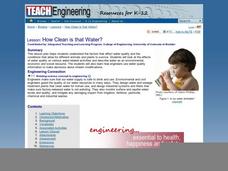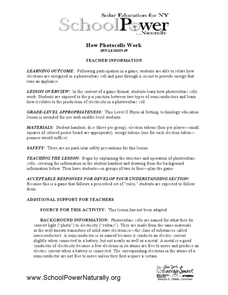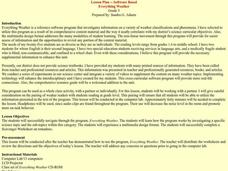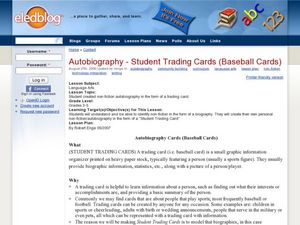NPR
Brainstorm and Evaluate Solutions
May the best idea win. In groups, scholars brainstorm solutions to the problem statement developed in the previous lesson. The best idea moves forward to the prototype stage.
NPR
Identify Criteria and Constraints
What defines success? The fourth installment of a 10-part series focuses on the criteria for engineering design success in solving the plastics problem. Pupils also consider any constraints.
PBS
NOVA Cybersecurity Lab Lesson Plan
Don't be fooled by cyber scams! An informative lesson teaches techies about cybersecurity. They watch videos, play a game, and engage in discussion to improve their understanding of online safety.
Teaching Tolerance
The Privacy Paradox
What's more important: privacy or convenience? Scholars consider the question as they take a digital privacy quiz and read a transcript of an NPR podcast about the privacy paradox. As a culminating activity, pupils develop a list of five...
Curated OER
How Clean is the Water?
Students read about and discuss water and how it is used as a resource and how engineers use technology to preserve it. In this water lesson plan, students look at a picture of water treatment and tell what is wrong with the picture.
Curated OER
Recipes for Foreign Foods
Upper graders choose a foreign country to research. They use the computer to locate three recipes from the country of their choice. Next, they link the information in each recipe to what they know about nutrition and food. Note: This...
Curated OER
How Photocells Work
Give small groups of physical scientists tokens that represent electrons in a photovoltaic cell. They play a dice game in which they move the tokens around, representing the flow of electrons through the p-n junction of a semiconductor...
Curated OER
A Day in the life of.....
Learners view a list of careers and choose one to research. They discuss each career, gather information, and list their resources, and they should compile. They write a flyer about their career and print it.
TryEngineering
Circuits and Boolean Expressions
Teach basic logic using Boolean operators. Young computer scientists learn about the operators NOT, AND, and OR, and how they can be expressed using Boolean notation, logic gates, or truth tables. Along the way, they learn about half...
Curated OER
The Water Cycle - Main Components
Present the water cycle to your middle schoolers with this lesson. After an anticipatory set, they participate in a Q & A session about the terms associated with the water cycle: evaporation, transpiration, condensation, and...
Curated OER
Fix It
Word processing practice and vocabulary blend with proofreading in a multi-purpose lesson that makes excellent use of an hour in the computer lab. Learners edit the grammatical, spelling, and punctuation errors in a given paragraph (not...
Curated OER
Creating an Author Brochure
Learners, while in the computer lab, visit a variety of web sites and read about the life and work of Langston Hughes. They create an author's brochure on Mr. Hughes from the data they collect from the various web sites. Each student...
Curated OER
Data With Candy
Students, while utilizing the classroom and the computer lab with a bag of colored candy, gather and interpret data, calculate averages and draw conclusions and draw a bar graph. They estimate how many candies are in the bag, what...
Curated OER
States of Being
Use this with your English language learners or your English grammar classes. Bring your class to the computer lab, and access this website. First they read about the states of being and some common mistakes. Then they complete a short...
Curated OER
Everything Weather
Hurricanes are the very definition of exciting weather. Your 5th graders can follow this instructional activity and explore hurricanes with the help of Everything Weather software. They will locate information and answer questions about...
Curated OER
Autobiography - Student Trading Cards
Motivate your class with this lesson! Learners use the trading card format to create an autobiography. They are given a list of characteristics to list, write down what they would like to include on their trading card, and head to the...
University of Waikato
Māui and the Sun
Using a Maori legend, How Maui Tamed the Sun, youngsters are introduced to the importance of sunlight to civilization. Teach them about nuclear fusion that occurs to produce the solar energy we later receive on Earth as electromagnetic...
Curated OER
Technology: Narrative Procedure Web Site
Pupils use Web page templates to publish how-to instructions on the Internet. The Web sites are used as instructional databases for others to view. Students also participate in electronic message boards to post and answer questions to...
Curated OER
Evaluating Sources
Learners conduct research and evaluate the sources they find. They identify various sources from their research. They employ technology resources to improve problem solving and decision making skills.
Pennsylvania Department of Education
Wind and Water Wheels
Students identify wind and water as natural resources that create energy. In this natural resources and energy use lesson, students work in groups to construct a pinwheel, then explore the effects of wind and water on the pinwheel....
Curated OER
Finding Mean, Mode and Median in the Computer Lab
Students create spreadsheets which will display and figure mean, median, and mode of a set of numbers.
Curated OER
Technology: Computer Basics
Students access a variety of resources on the Internet related to basic computer operations and parts. They examine the parts of a computer and the history of computers, view timelines, play games, and read tips on Internet safety.
Curated OER
Computer Technology Bingo
Students review new vocabulary from their computer technology class. In groups, they participate in a bingo game in which they define terms from a worksheet. They are assessed based on an attached rubric and discuss any terms they are...
Curated OER
How Does Technology Affect Me?
Students compare and contrast the tools used by Native Americans from the Paleo, Archaic and Woodland periods. The visit and discuss a website describing inventions and the problems they solved. They use this historical information to...

























